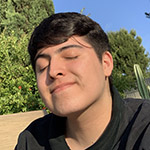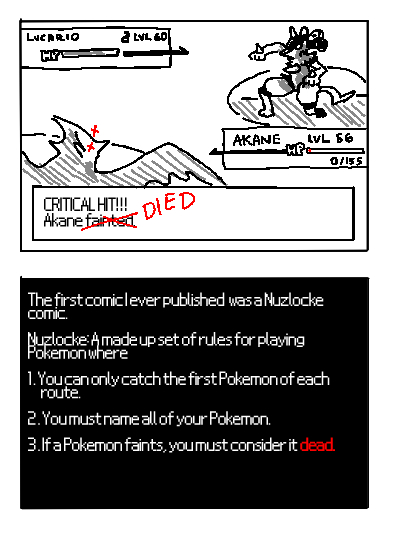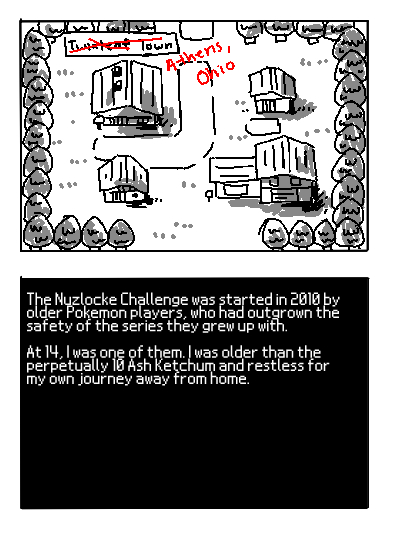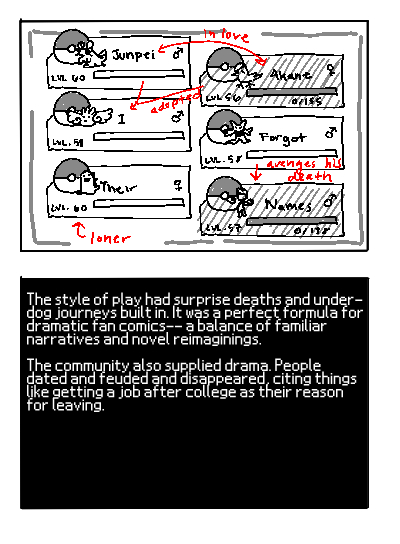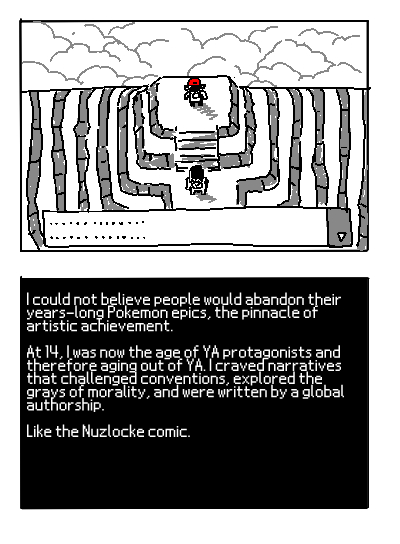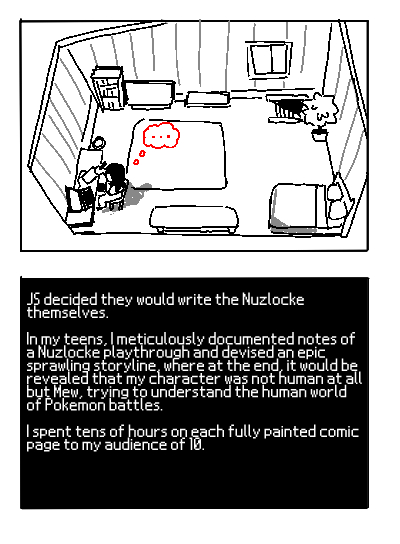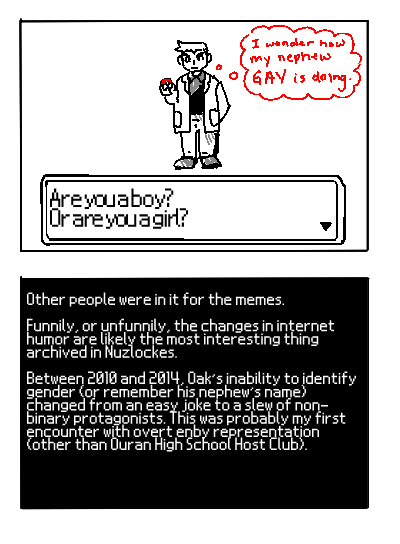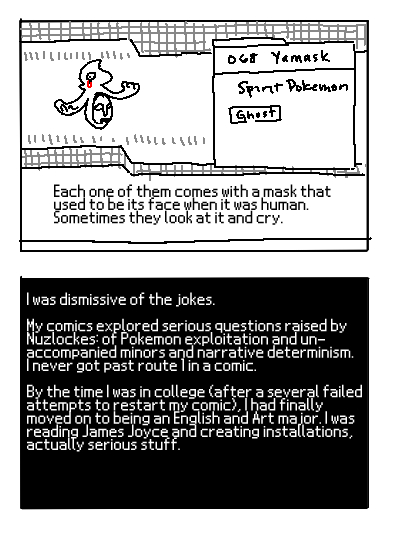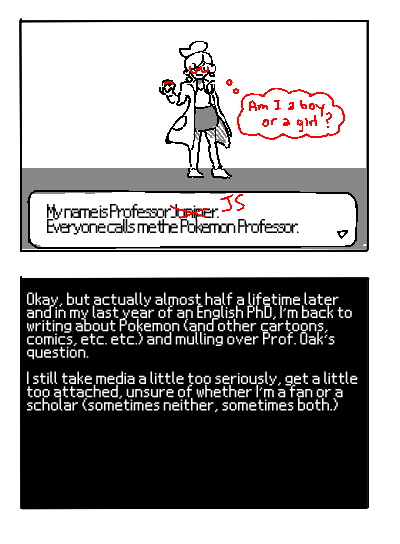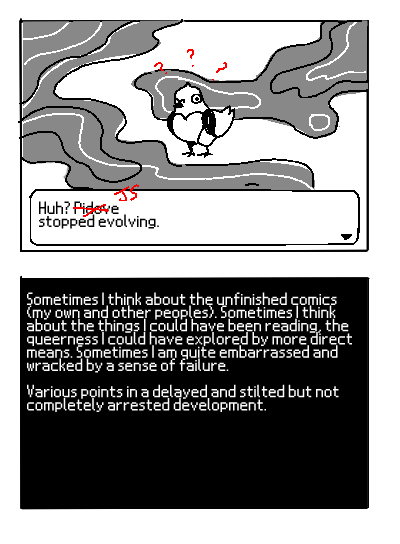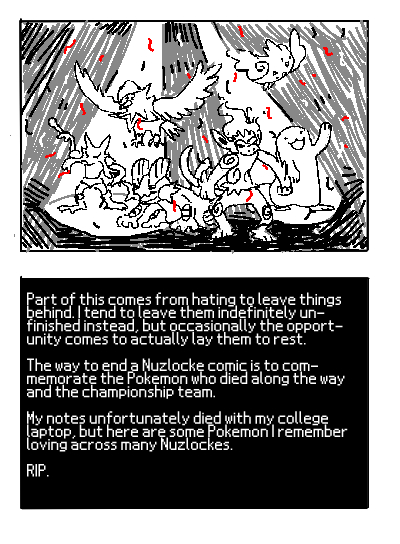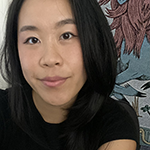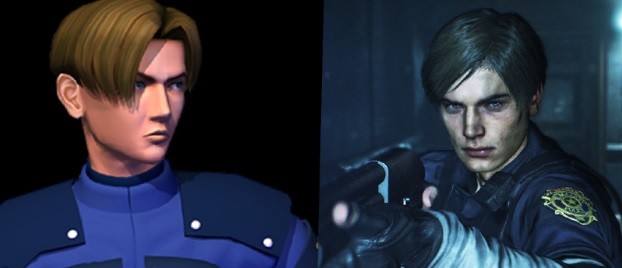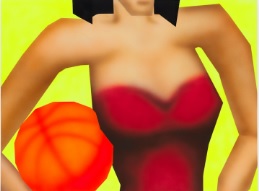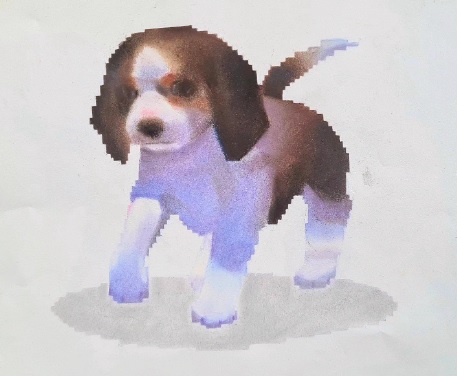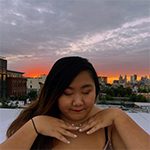“Are you a boy? Or are you a girl?”: A Walkthrough
“The game starts by asking you if you’re a boy or girl.”1
You’re sitting in the back of the car en route to the outlet malls a few towns over. In front of you is a GameBoy Color with a Pokemon Crystal cartridge inside. You’re five years old – going on six soon – and admittedly too young in the eyes of many to be comfortable reading, much less well-versed in playing video games. That doesn’t stop you.
> turn on the game
The game starts and a prompt appears.
“Are you a boy? Or are you a girl?”
> read it again. carefully
“Are you a boy? Or are you a girl?”
(It’s a rhetorical question)
(It’s an accusation)
(It’s just some stupid dialogue from the Professor)
A selection screen appears.
“Boy”
“Girl”
> hide the screen
You curl up in the seat, obscuring the screen from view.
MOM and DAD won’t notice. They can’t. They’re in the front seat, preoccupied with a conversation you barely understand.
> eavesdrop
Some tito, a friend/your uncle/someone at work, who’s not doing well. They pray for his family. They’re always praying.
> pray
You don’t know how. But you try.
Nothing happens.
The screen hasn’t changed.
> make a choice
You must make a selection.
> make a choice
You must make a selection.
> boy
It feels like lying. It feels like the truth, or at least closer to it.
> hide.
The game continues, asking questions about the day and time. Mundane. Objective. Easy.
> move on
“As this is a role-playing game, there is more to roles than just the role you play in combat. You also will have a role in society to play, and that will mostly be determined by things such as your race, gender and background.” 2
You start the game by waking up in your room. Get ready for the day by going left to the bathroom and look in the mirror.
(It’s you!)
Go downstairs where your DAD is waiting to take you to school.
In the cutscene, your friend SILVER is talking with a gang of grunts. His best friend is GRUNT LEADER. They don’t want to play with you because you’re a girl and supposedly don’t know anything about Pokemon.
SILVER laughs, not because it’s true (he knows it’s not) but because he’s a boy, like them. Prepare for a fight.
> Attack
“I’ve played all the games! I probably know more than you!”
Miss!
GRUNT hurls an insult.
“We don’t care. Go dig your family out of the dirt. I hope they’re dead.”
(It’s typhoon season in the Philippines. Flash floods and mudslides have made international headlines. Your immediate family isn’t affected, at least not physically. It doesn’t matter.)
Critical!
You can’t use any items, defend yourself, or flee. You cannot win this encounter. You’re not supposed to.
SILVER doesn’t laugh. (He’s brown like you. He hurts like you. You both aren’t boys like them, and you never will be. But you wish you were and there are parts of yourselves you are willing to betray to get there). He doesn’t interfere.
Move on. Play Pokemon and Fire Emblem and Dragon Quest and Final Fantasy and Kingdom Hearts. Play as boys and girls (and girly boys and boyish girls). Build up your party again and again. Save scum so you never lose a fight.
[Spoiler: You and SILVER aren’t friends anymore.]
You’re back in the Philippines for your uncle’s wedding. You’re supposed to be a flower girl. MOM and your LOLA are in the room preparing.
Speak to your LOLA. She will ask how you want your haircut.
Option 1
“Just a little bit.”
> MOM approves.
Option 2
“Short.”
> MOM disapproves.
Option 3
“Short, like a boy.”
> MOM disapproves and yells at you for half an hour.
It ultimately doesn’t matter. LOLA approves either way but will do as MOM demands. Change for the wedding and look in the mirror. It’s you, but uncomfortable. The dress you wear is itchy, your tights are too tight, and your shoes are too stiff. Your LOLA hugs you when you cry, promising it’s only for a little while.
She hugs you the first time you come out as queer.
Fall in love with wearing the words “BUTCH” and “DYKE.”
[Spoiler: it’ll take longer to love the words “FEMME” and “FAGGOT,” but you’ll wear them just the same]
Spend hours in character creators making alternate versions of yourself. There’s always something missing
gender < – – >
height < – – – – – >
weight < – – – – – >
skin < – – – – – >
eyes < – – – – – >
and you can never get it right.
In your room late at night, check the door of your room to find a towel shoved into the crack, hiding the light from your parents. You’ll need to do this every time you decide to stay up. After a bit of downtime, you’ll get a text from a friend to hop onto Gaia.
Log on to see your sprite appear: some kind of goth wizard/ninja in a bandit mask. You’re happy with the laser sword and angel wings, but games like this don’t carry your skin tone. Regardless, you’re approached by several equally ornamented (and pale) avatars.
LocalDemon: Haiiii
Uniquorn: :3
XoXStina: Its u!!
RP holding hands and making out and being in love. You don’t know their real names. You don’t know what they look like. Wish that it was this easy.
“The differences between genders in this game are fairly limited. A few NPCs will address you differently, depending on your gender, and there are more opportunities to get laid if you’re male (although the sequel really makes up for it in favor of the ladies). It’s ultimately not a big deal” 3
=============
ROMANCE GUIDE
=============
ABIGAIL
Likes: Candy, Anime, Emoticons, MMOs with dressup mechanics, Men, Women
Dislikes: Unavailability
SHANE
Likes: Grilled meat, Horror movies, Practical jokes, Smash Bros., Other Asians, Men(?), Women
Dislikes: Being alone
PENNY
Likes: Iced coffee, Acoustic guitar, Band merch, Left4Dead, Other Filipinos, Men, Women(?)
Dislikes: Commitment
=============
Your friend JACKNIFE goes on and on about how Mirror’s Edge combines his favorite things: parkour and badass Asian women. He tells you how hard he is. Choose however you want to react, it doesn’t affect the outcome.
Later he asks you what it’s like to be bisexual.
(It’s a rhetorical question)
(It’s an accusation)
(It’s a prayer)
=============
ALEX
Likes: Energy drinks, Heavy metal, Skateboards, First person shooters, Men(?), Women
Dislikes: Questioning his masculinity
HALEY
Likes: Instant ramen, Adult cartoons, Crystals, Racing games, Men, Women
Dislikes: Questioning your masculinity
SEBASTIAN
Likes: Chewy candy, classic films, dandelions, Skyrim, Other Asians, Men(?), Women(?)
Dislikes: Questions
=============
Turning off your PC, inspect your reflection in the blank screen, blurry in the dark. Pull your hair back, then take it down. Picture what it’s like to be a woman. Picture what it’s like to be a man. Picture being wanted as either. Squint at what you see. It’s you.
You buy Mirror’s Edge but can’t play more than twenty minutes before feeling sick.
Leave your hometown to go to the Big City several states away. Everyone introduces themselves, including their pronouns (how nice!), and you really want to
> make a good impression
> reinvent yourself
> make a different choice
Say “you can call me whatever you’d like, just don’t call me a lady,” to boost your approval and unlock new abilities.
[Spoiler: you’re the first and only asian she dates]
[Spoiler: you’re the last asian he dates]
[Spoiler: she only dates other asians]
[Spoiler: he only dates asians in general]
[Spoiler: she fucks a filipino guy right after you.]
[Spoiler: he fucks a filipino guy right before you.]
It’s a coincidence.
Your partner’s friends (white like them) don’t like you and don’t want you dating them. Their other friends (brown like you) put together the pieces. They’re the ones that intervene.
It’s not about incompatible personalities. It doesn’t matter if you’re queer like them, trans like them, nonbinary like them. You’ll never be like them, but they expect you to want to.
You get called every possible slur in chat even if your mic isn’t on. Sometimes it feels good. It feels closer to the truth.
[Spoiler: You can be seen for you are, or you can be desired.]
How many endings are there? 4
How do I get the true ending? 5
The week before your LOLA dies back in the Philippines, choose to make pancit for Friendsgiving.
She speaks Taglish over Facetime. You’re so beautiful and pretty and handsome. She likes your hair. She calls you gwapo and pogi and she’s proud of you for cooking more. She says she wishes she could hug you. Play Pokemon Shield the whole flight to her wake.
You never get to come out to her a second time. You never learn enough Tagalog to do so. You know you could have done it in English.
Schedule your shots, work out a bit more.
Dyke nights stop feeling like home, especially when you forget to shave the patchy goatee.
Circuit parties also don’t cut it. You end up too short to be read as a man in most cases. You don’t want to get top surgery but you don’t like the way you stick out. You will stick out.
You always get clocked and even though it’s not necessarily wrong, it’s also not right.
You stay in more, blaming the 40+ hour campaigns in your RPGs you want to finish. Keep buying them. Never finish.
Look in the mirror. It really is you.
Make a queer Discord server. Join a queer Minecraft realm. Fall in love.
She brings you to your testosterone injections and to farmer’s markets, and you get her the Stardew Valley soundtrack on vinyl.
You’re sitting in the back of the car en route to some mountains a few hours away from DAD’s hometown. Scroll through Discord while your younger cousins also tap away at their phones. They ask if they can be your friends.
> add them
Added. You immediately are sent a DM.
> read
SilverBullet: Can I show you some stuff I drew? It has to be a secret though.
> yes
SilverBullet: cool
You receive a few illustrations – Genshin Impact fanart, Among Us memes, and a self-portrait of your cousin wrapped in a trans pride flag.
> it’s you!
SilverBullet: it is 🙂
1 Pokemon Crystal Version – Guide and Walkthrough (GBC) by Rolent_X 2002).
2 Dragon Age: Origins – Guide and Walkthrough (X360) by scopius2 2009.
3 Fallout – Character Creation Guide (PC) by Haeravon 2014.
4 Dragon Age: Origins (Xbox 360) Q&A by Reemption626 2010.
5 Persona 4 Golden (PlayStation Vita) Q&A by GEB123 2013.
Lyn Rafil (they/them) is a queer nonbinary filipino-american first, an unabashed nerd second, and everything else third. They have a B.S. in Media, Culture, and Communication from New York University; and they work commercially as a researcher, strategist, and writer specializing in cultural and media analysis of games and gaming communities. You can get in touch with them at lrafil.com.
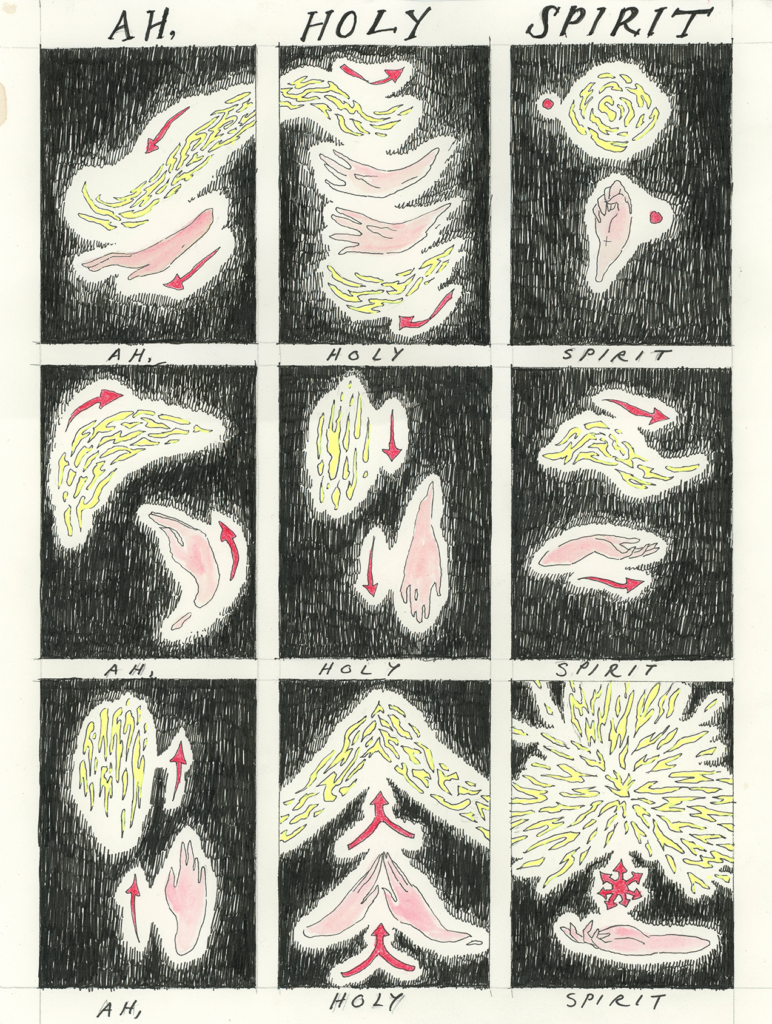
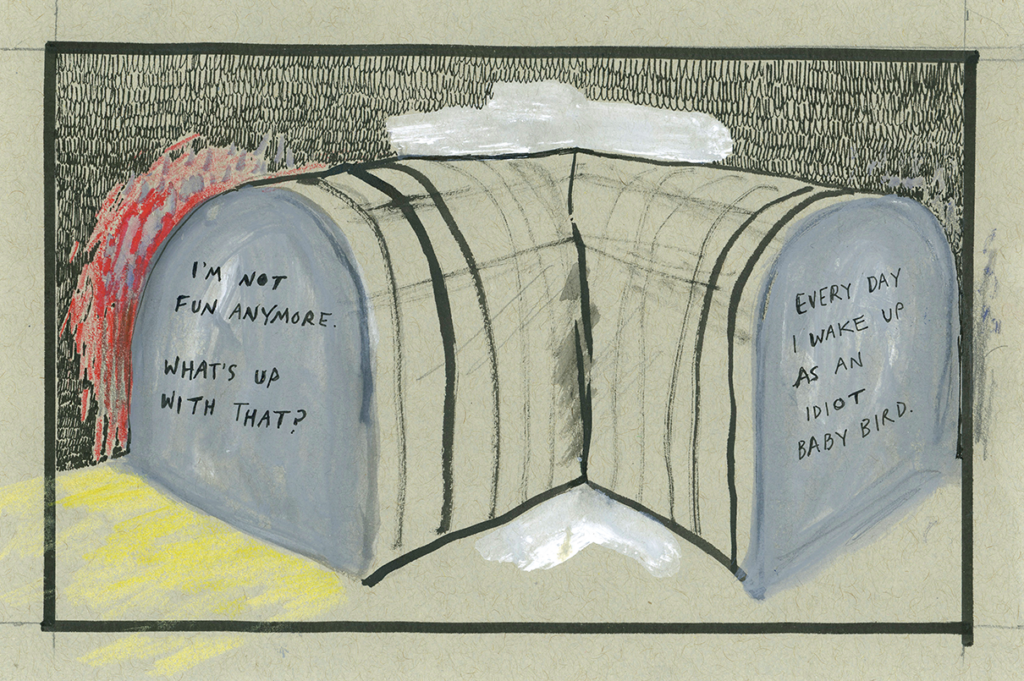



 BACK TO ISSUE
BACK TO ISSUE












